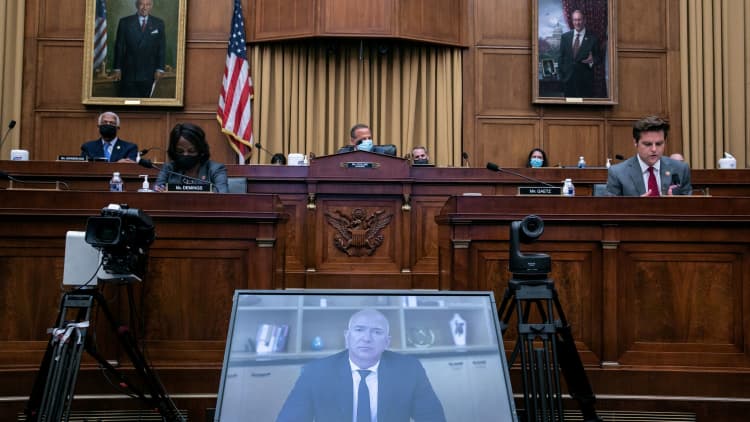Rep. Lou Correa (D-CA) questions Intelligence Committee Minority Counsel Stephen Castor and Intelligence Committee Majority Counsel Daniel Goldman during House impeachment inquiry hearings before the House Judiciary Committee on Capitol Hill December 9, 2019 in Washington, DC.
Doug Mills | Pool | Getty Images
A California lawmaker who has opposed efforts to crack down on the tech industry is the leading contender to become the highest ranking Democrat on the House Judiciary subcommittee on antitrust.
Rep. Lou Correa, who represents a portion of Southern California, is being discussed as the likely successor to prior Ranking Member David Cicilline, D-R.I., according to four sources who spoke on background about private discussions. Cicilline previously announced he would leave Congress effective June 1.
If Correa ascends to the role, it would represent a stark reversal in attitude at the top of the subcommittee, which just a few years earlier led a massive investigation of Amazon, Apple, Google and Facebook that found each maintained monopoly power. Under Cicilline, the CEOs of each company faced hours of grilling before the panel. The Judiciary Committee also managed to pass a package of antitrust bills that aimed to rein in the power of the top players in the industry by preventing them from favoring their own products in their marketplaces or by prohibiting the ownership of two businesses that present a conflict of interest.
Things could still change, but Correa is well-positioned based on his seniority. Correa’s team has spoken with Judiciary staff about possible subcommittee priorities, according to a House staffer, and a vote could happen in the next couple of weeks.
A spokesperson for Correa declined to comment.
One senior Democratic aide described the prospect of Correa becoming ranking member as a “great windfall for the tech companies.” If he ascends to the top Democratic role, he would sit beside Chair Thomas Massie, R-Ky., who was chosen over previous ranking member of the panel Rep. Ken Buck, R-Colo. Buck has been the top Republican champion of the tech antitrust bills.
While Cicilline and Buck championed bills that sought to crack down on what they saw as unfair practices by Big Tech companies and supported increased funding to antitrust enforcement agencies, Correa opposed the tech antitrust bills and voted against legislation that would raise money for the Federal Trade Commission and Department of Justice Antitrust Division.
Democrats are in the minority in the House, so whoever fills the position won’t get to set the agenda for the subcommittee. But several sources who spoke with CNBC said Correa’s track record suggests tech antitrust would take a back seat for a while in the subcommittee if he gets the nod. Already, the types of bills that advanced out of the Judiciary committee in the summer of 2021 are now being stalled with the help of tech lobbying.
Correa received an endorsement from the Chamber of Commerce in his 2022 campaign. The Chamber has notably opposed progressive action by the FTC and has warned that legislative reforms in the U.S. could undermine the country’s economic security. Since 2018, Correa has received around $17,000 in donations from tech company political action committees, including those of Amazon, Google and Meta.
Correa is unlikely to be a popular choice among progressive groups. Groups like the Demand Progress Education Fund, Economic Security Project Action and Fight for the Future urged the committee in April to select a replacement to Cicilline “with a similarly steadfast commitment to anti-monopoly policies” who voted for all of the bills in the House Judiciary tech antitrust package.
Several senior members of the subcommittee who support tech antitrust reform would have seemed more likely candidates for the top Democratic seat not long ago. But the field is complicated by the fact that many of them already have ranking member positions on other subcommittees they may not wish to give up. That includes the antitrust subcommittee’s former vice chair Joe Neguse, D-Colo., as well as Reps. Mary Gay Scanlon, D-Pa., and Pramila Jayapal, D-Wash.
Even so, the senior Democratic aide said a focus on tech antitrust issues is not going away entirely, even if they become less of a focus in the House. The aide pointed to ongoing efforts in the White House and enforcement agencies to tackle digital competition issues.
“Those issues are still there,” the aide said. “They’re not going away.”
